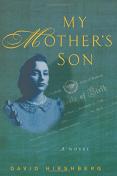BKMT READING GUIDES
My Mother's Son: A Novel
by Hirshberg David
Hardcover : 368 pages
1 club reading this now
0 members have read this book
Introduction
"Hirshberg's debut novel packs both emotional punch and a vivid portrait of Jewish American life in post-WWII Boston. . . . Readers will find connections here to Michael Chabon's The Amazing Adventures of Kavalier & Clay and to Saul Bellow's classic The Adventures of Augie March." —Booklist (ALA), starred review
"This amazing mosaic of fact and fiction will hold readers in its grip from the first to last page." —Library Journal, starred review
Winner, Independent Press Award 2019 Literary Fiction
Gold Medal Winner, Best Regional Fiction, 2018 Independent Press Awards
Winner, Best Regional Fiction, 2018 National Indie Excellence
Awards Winner, NYC Big Book Award in two categories: 2018 Historical Fiction and Debut Fiction
Winner, Three CIPA EVVY Awards: 2019 Literary Fiction First Place; 2019 Historical Fiction Second Place; 2019 Debut Fiction Second place
My Mother's Son, the meticulously-crafted debut novel from David Hirshberg, is a story told by a radio raconteur revisiting his past in post-World War II Boston, the playground and battleground for two brothers whose lives are transformed by discoveries they never could have imagined. From the opening line of the book, "When you're a kid, they don't always tell you the truth," the stage is set for this riveting coming-of-age story that plays out against the backdrop of the Korean War, the aftermath of the Holocaust, the polio epidemic, the relocation of a baseball team, and the shenanigans of politicians and businessmen. Hirshberg deftly weaves together events, characters, and clues and creates a rich tapestry of betrayal, persecution, death, loyalty, and unconditional love that resonates with today's America.Editorial Review
No Editorial Review Currently AvailableExcerpt
PrologueThe yin and yang of my life
When you’re a kid, they don’t always tell you the truth.
They tell others that they don’t want to hurt you or they think you won’t understand. But in reality, it’s just easier if they tell you what makes them feel good, or what gets them out of a jam. ...
Discussion Questions
1. How does the opening line – “When you’re a kid, they don’t always tell you the truth”–manifest itself throughout the book?2. Do you relate to the opening line and if so, how?
3. The author drops tells like breadcrumbs to presage later events. The very first one is the word “smirk” on page 2. Can you identify others?
4. While the origins of Joel and Steven’s names are noted, why are their parents’ names never mentioned?
5. Is it a coincidence that four men are named Abraham, Isaac, Jacob and Solomon or are they simply representative of Jewish American names from the late 19th and early 20th centuries?
6. In 1952, Joel and Steven biked all over Boston. What does that say to you about the cultural changes that have taken place in the last 60 plus years?
7. Does the use of foreign words, such as Schickalsfrage, enhance or impede your reading?
8. Was the dilemma that Dr. Daniel Burgas faced in Korea similar to what Dr. Jacob Goldblum faced in Germany? What does that say about the choices we face?
9. Who is the most important character in the book and why do you feel this way?
10. Since Joel is a radio raconteur, is it possible that he made up all the stories? If so, why would he have done this?
11. What does the author mean when he writes, “…solitude in moderation can be an ally if you get along famously with your conscience”?
12. Do you agree that, “There’s no difference whether you hear something from the point of view of first person actual or third person fictional if it interests you, moves you, or gets you to think about things from another perspective”?
13. There are three distinct generations in the book, examples of which include: Papa and his pals; the boys’ parents and aunt and uncle; and the boys’ friends. Are the generational distinctions presented in the book a thing of the past or do they exist today, and if so, how have they changed?
14. What is your reaction to what the author says about the events of 1952: that they were “…the prism that refracted our societal attitudes, values, and policies toward war, disease, politics, sports, business, and immigration”?
15. Does setting the book in an earlier time allow you to have a conversation about current headlines without wrapping them in today’s ‘talking heads’ political climate?
16. One can read this novel on three different levels: (1) As a novel of Jewish identity; (2) As a story–you could say a Bildungsroman; and (3) As a mirror for what’s going on today. Discuss how each of these resonated with you.
Book Club Recommendations
Recommended to book clubs by 0 of 0 members.
Book Club HQ to over 90,000+ book clubs and ready to welcome yours.
Get free weekly updates on top club picks, book giveaways, author events and more








